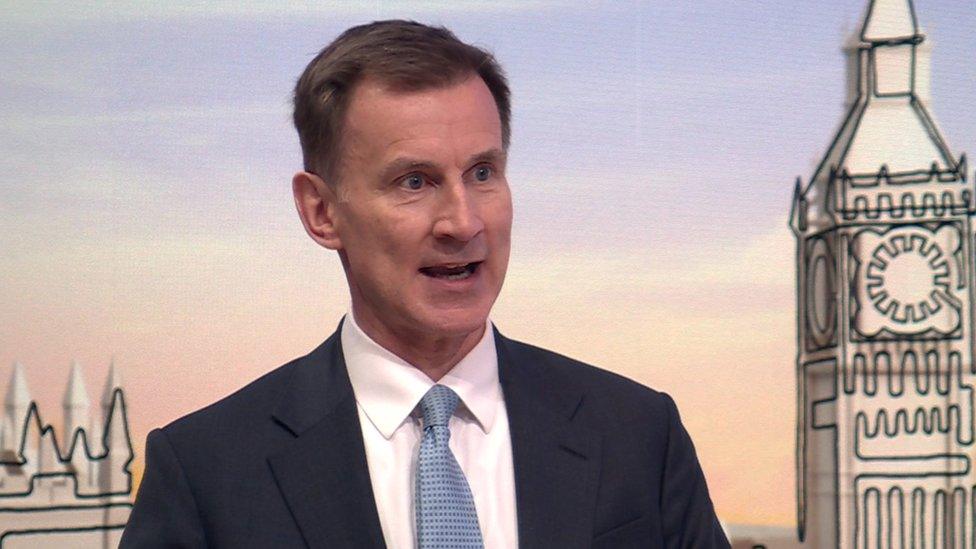Budget 2024: Shona Robison urges Jeremy Hunt to resist tax cuts
- Published
Public services investment needed - Shona Robison
Finance Secretary Shona Robison has urged the chancellor not to cut taxes in Wednesday's Budget.
Jeremy Hunt has said he wants to move towards lower taxes, but will only do so in "a responsible way".
But Ms Robison told BBC Scotland's The Sunday Show the UK government should prioritise investment in public services.
She also defended the Scottish government's budget, which opposition politicians described as "tax-and-axe".
Earlier, Mr Hunt told the BBC's Sunday with Laura Kuenssberg it would be "unconservative" to cut taxes by increasing borrowing.
The chancellor is under pressure from some Conservative MPs to reduce taxes, ahead of an expected general election this year.
A further cut to National Insurance is believed to be among the measures being considered.
But Ms Robison said she shared the view of bodies, including the International Monetary Fund and the Office for Budget Responsibility.
The deputy first minister told The Sunday Show: "All of these organisations have said the same, that tax cuts are unaffordable and, indeed, it is the investment in public services that are needed.
"I agree with that and I really hope that Wednesday will see a change in the direction that Jeremy Hunt takes, particularly on investment on capital so we that we can invest in our infrastructure, things like affordable housing."

The chancellor appeared on the BBC's Sunday with Laura Kuenssberg ahead of Wednesday's Budget
Ms Robison added taxes should not be reduced as the UK economy had gone into recession and called for the £1.6bn cut to Scotland's five-year capital budget to be reversed.
The Scottish government's budget passed its final vote at Holyrood on Tuesday.
Ms Robison said her £59.7bn spending plans would protect frontline services and include funding for a council tax freeze.
But opposition parties warned the measures could harm economic growth and they criticised cuts for affordable housing.
The finance secretary described the budget as "really challenging" and said she had to make "difficult choices".
And she said the affordable housing cuts were linked to UK government cuts in both capital funding and financial transaction funding.
Ms Robison added: "I have said it is the number one issue that I want to address if I get that additional capital from the Spring Budget on Wednesday."
She also said the one-year freeze on council tax was an intervention designed to help with household budgets during the cost of living crisis.
So far 30 of Scotland's 32 local authorities have set their budgets but only two - Argyll & Bute and Inverclyde - have confirmed they will put taxes up for 2024/25.
Ms Robison told The Sunday Show: "We are providing £210m to local authorities to help them freeze the council tax and we expect that council tax payers get some benefit out of that investment."
The minister added that, given the current financial climate, she believed local authorities had been "treated fairly".
'Dire record'
Scottish Conservative finance spokeswoman Liz Smith later criticised her comments.
She said: "It's ridiculous of Shona Robison to be giving the UK chancellor advice on growth, when the SNP's dire record led to her savage tax-and-axe budget that means Scots will be paying more to receive fewer and worse services.
"It's even more absurd for her to call for housing investment, when she has just cut Scotland's housing budget by 26%, and Shelter Scotland say the SNP are 'gaslighting' the public on the subject."
Ms Smith also described the handling of the council tax freeze as "shambolic".
She added: "Her financial incompetence has left councils so desperate that they are appealing directly to the UK government."
Meanwhile, Scottish Labour's finance spokesman Daniel Johnson said he was "very uncomfortable" with the situation faced by local authorities after the council tax freeze announcement.
He told The Sunday Show: "We had a pledge that was driven by the need to give the first minister a talking point at his conference in the autumn.
"Ever since then they have been playing catch up, leaving our councils in utter chaos."
Mr Johnson also condemned the decision to put plans on hold to build new hospitals, surgeries and a network of treatment centres in Scotland.